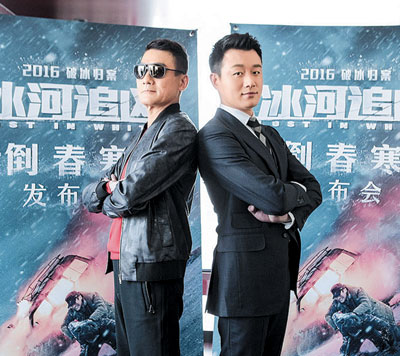|

FANS of flicks filmed in frozen places, like “The Revenant,” may find “Lost in White” merits a hot spot on the silver screen. Shot in temperatures lower than -40 degrees Celsius in Northeast China, the movie also offers car chases, explosions and lots of gore.
While Leonardo DiCaprio recently won an Oscar for his performance in the frozen wilderness of “The Revenant,” Chinese actor Tong Dawei joked at a film-promotion event last week that “an actor has to suffer in an icy environment to get the top award.”
In the upcoming Chinese thriller “Lost in White,” which will premiere April 15, he plays a role that is anything but comfortable. “I thought I was fully prepared (for the role), but I was wrong,” says Tong.
Most of the shooting was done in temperatures below -40 degrees Celsius in Northeast China.
Even the promotion event was held on a skating rink, probably to re-create the film’s cold atmosphere.
For Tong, 37, the son of two police officers in real life — otherwise known for his image as an idol bringing sunshine — the movie also gave him a chance to realize his dream of playing such a role on screen.
While the detailed storyline of the film was not revealed, the movie is expected to have a dramatic ending.
Hong Kong silver-screen veteran Tony Leung Ka-fai also plays a key role in the film.
In one scene he is rescued from a frozen lake. For the shoot, Leung, 58, preferred to allow himself to be immersed in the cold waters of the lake rather than use cosmetics to create the impression of feeling frozen, in a bid to give the scene a more realistic touch.
“He wanted to give young actors an example of how they should react when they encounter such a tough environment,” says Tong.
Meanwhile, Leung says that the tantalizing screenplay called for such sacrifices.
The film also marks the big-screen debut of director Xu Wei, who has moved from being a cinematographer to leading the team.
“I felt huge pressure directing the film,” says Xu. “It was especially difficult doing so many bomb explosions and car chases on ice, something uncommon in Chinese films.”
However, in spite of his perceived lack of experience, he says the screenplay gave him lots of room to be creative and try out options for the action scenes on ice.
The domestic thriller, which makes an appearance on mainland screens after a considerable absence of such kind of movies here, is a welcome change as the genre has seen a rise in its popularity in recent years thanks to offerings from South Korea.
Last year’s domestic productions “Saving Mr. Wu” and “The Dead End,” for example, both received generally positive comments from critics and filmgoers in China.
And, in a nod to South Korea’s skills when it comes to this genre, an action director from the country was invited to work with the “Lost in White” team.(China Daily)
|

